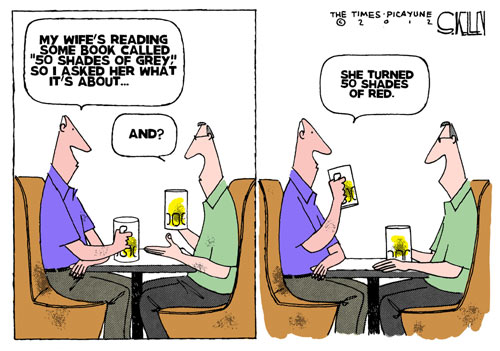
You've heard about "Fifty Shades of Grey," right? It's all over the place, like something nasty on the bottom of your shoe.
"Fifty Shades" is truly a form of residue: It's what's left over when you extract the intelligence, wit, energy and originality from a book.
The forthcoming movie is based on a book, which itself was based on a blog, which was actually written as fan fiction for a novel called "Twilight" in which feminine subjugation, abjection and erasure of the feminine self are central.
I'm not kidding, either.
"Twilight," you'll remember, is the book where a girl falls in love with a vampire who's maybe 97 years old but still in high school.
(Can somebody get this 97-year-old kid a Kaplan course or something? Suggest that he has learning-difference issues? There's no shame in it. But nobody should have to take trig for 80 years, not even if you're undead. Just drive a stake through his heart already.)
Anyway, in "Twilight" the girl becomes a vampire because her main squeeze is one. You know how it is: The woman always takes on the man's status. He's poor, she's poor; he's rich, she's rich; he's a bloodsucker, she's a bloodsucker.
And yet somehow "Fifty Shades of Grey" manages to make "Twilight" look like a feminist manifesto.
Frankly, it makes "I Hope They Serve Beer in Hell" and "American Psycho" — two seriously misogynist best sellers — look like women-friendly works.
"Fifty Shades of Grey" associates masculinity with lots of money. We're talking billionaire-before-30 wealth, not a steady-job-with-benefits money. It associates femininity with shackles. We're talking literal, not metaphorical, shackles.
But the metaphorical ones are there, too. The 22-year-old woman from "Fifty Shades" is instructed by her rich older boyfriend about what to wear: "I may need you to accompany me to functions, and I want you dressed well." In 1963, Lesley Gore insisted "When I go out with you/ Don't put me on display."
That was an important line in 1963 because we were establishing that women were not things, right? Because women are not objects?
But in "Fifty Shades," becoming an object is actually the ambition held by the college-graduate female protagonist; she enjoys feeling "Like a receptacle — an empty vessel to be filled at his whim."
You know, like an ash-tray.
Her rich guy's philosophy of life is cribbed from CliffsNotes on Andrew Carnegie. Unable to formulate his own idea, he repeats Carnegie, as if having learned the words phonetically: "A man who acquires the ability to take full possession of his own mind may take possession of anything else to which he is justly entitled."
So she is "anything else." Awww. Clearly the term will figure largely as an endearment on this year's Valentine's Day cards: "To My Anything Else, To Which I am Justly Entitled." And there will be a picture of bunnies hugging.
He didn't even say "To Whom." She is an "It."
Too bad the rich guy — Christian Grey — didn't get to the part where Carnegie writes "There is little success where there is little laughter." Grey is singularly humorless and proud to describe himself as a "hopeless joke teller."
A moody sadist who doesn't like to be touched, can't tell a joke and about whom the female protagonist says "He wants to hurt me. He says he'll think about my reservations, but it still scares me" — this is the new yummy?
I've written about similar issues before: The celebration of violence or the threat of violence, contorted and idealized into something "romantic" remains unsavory to me. Whether manufactured by men or by women, the product is an anathema.
Perhaps I'm beating a dead horse. It's still better than beating a live woman and calling it "love."
Gina Barreca
The Hartford Courant
(TNS)
Comment by clicking here.
Gina Barreca is a columnist for The Hartford Courant.



 Contact The Editor
Contact The Editor
 Articles By This Author
Articles By This Author